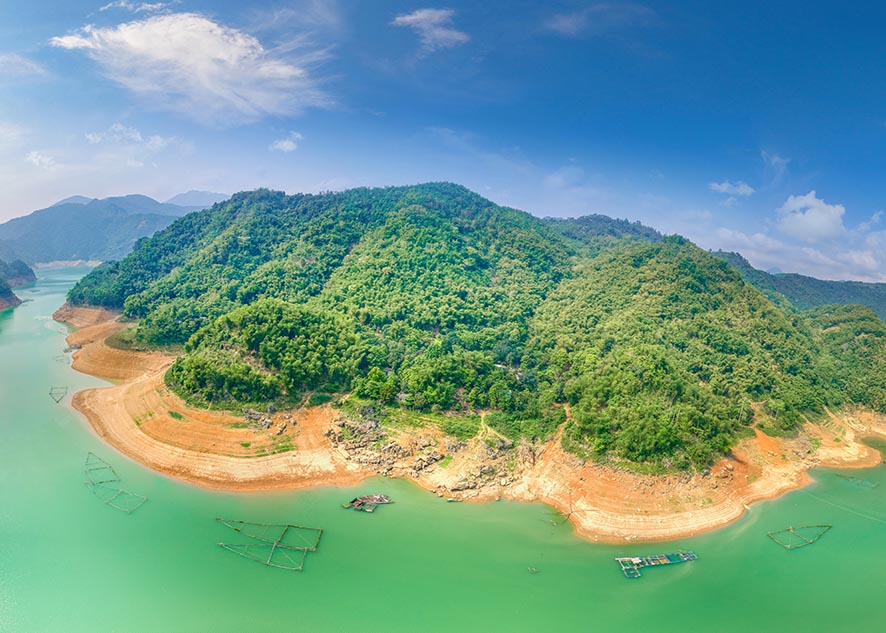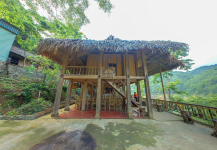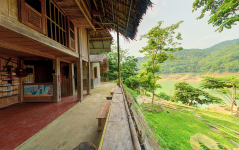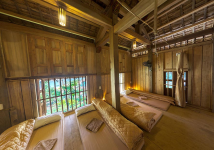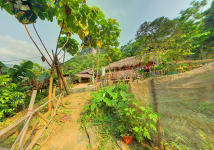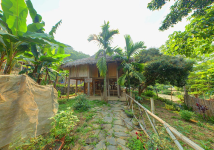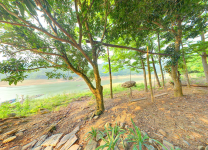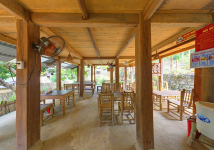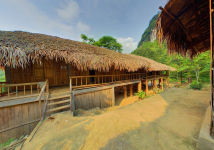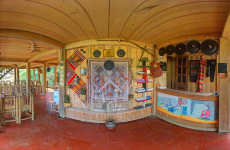DA BIA HAMLET
xom Da Bia, huyen Da Bac, tinh Hoa Binh Xã Tiền Phong, Huyện Đà Bắc, Tỉnh Hoà Bình -
Detail of DA BIA HAMLET
Description
DA BIA HAMLET – DA BAC DISTRICT
Da Bia village, Tien Phong commune, Da Bac district, Hoa Binh province is a village of Muong Ao Ta people who settle on the riverbank of Hoa Binh reservoir. This place is a pristine land that is starting to form and develop the type of homestay ecotourism, a growing tourism potential on Hoa Binh reservoir.
There are many ancient stilt houses, the pristine of ethnic minorities is still reflected in the customs and traditions here. Visitors can enjoy the rustic dishes of the Muong people such as steamed fish, bamboo-tubed rice, glutinous rice wine, and steamed vegetables. Those dishes are as simple as the people here.
We can take the waterway and road very conveniently when visiting Da Bia village. If you choose waterway, we can depart from Bich Ha port or Ba Cap port (Hoa Binh city) or Thung Nai port (Cao Phong district), it takes about 1-2 hours on Hoa Binh reservoir to Da Bia village. If you take the road, from Da Bac town to Da Bia village, (Tien Phong commune), you have to take a winding road running along the hillside from Hien Luong commune to Vay Nua, then to Tien Phong commune.
There are different interesting things when you go to Da Bia village by road or waterway. By the waterway, we can admire the view of Hoa Binh reservoir with the magical blue water and airy sky, big and small islands among the lush green of the nature as if a space in a fairy tale. As for the road, we experience each of the rugged zigzag roads, the two sides of the road are shady green trees, the melastomas, the flowers in the forest are blooming covering the whole road with yellow and purple, on the side is a deep lake.
Da Bia village is 35km away from Da Bac town, about 100km from Hanoi, which is an ideal place for travelers who want to use the time to relax, explore and experience the lives of upland people in general and the Muong Ao Ta people in particular. A special attraction for visitors passionate about exploring is that this place still retains intact natural things. We can feel the peace, tranquility, breathe in the fresh, cool atmosphere of the primeval mountains, watch the white clouds floating on the top of the mountain, and hear the song of all birds in the sky, etc. All these things help us forget the tiredness, sorrow, tension of the crowded, complicated life.
Besides, we experience activities and services such as cycling, kayaking, jogging around the reservoir. There are both exploration activity and a useful form of exercise for visitors. You can learn about the old stilt houses that have been built for generations; sitting and talking to the elders whose hair are white but healthy and their mind still alive; they share about the life of the people here that is so simple, no hustle, selfishness, people in the village unite and love each other, take care, share difficulties, joy, sad, etc.
People here not only can speak ethnic languages, Viet language, but most of the women, young people, and children can also speak English and French fluently. They will use it when transacting with foreign visitors. Their speaking skills is mainly by self-study and communicate with guests.
Also, we can participate in water games such as rafting, kayaking, waterfall bathing, wading streams, exploring caves. After the experience activities, we relax in the cool water and enjoy the rustic dishes, specialties of the mountainous countryside. The cuisine here is mainly "self-sufficient" which is chicken, pig, Da river fish, forest vegetables, etc. The dish is cooked according to the local method that is the aroma of doi seeds, the sweetness of bamboo shoots, the bitterness of forest vegetables. All are clean foods prepared under the skillful hands of the men in the family of Muong Ao Ta. Here, men will prepare dishes, women will help and prepare the entertainment activities, wear beautiful clothes in charming Muong costumes to serve guests staying at home.
In particular, only Da Bia village maintains a cultural beauty that many places cannot preserve which is Quan Tu Giac. There is no seller in the store, visitors can take the goods by putting money in the basket. In the past, the store was built to trade, exchange products made by the people in the neighborhood that they cannot use them all. The name is Quan Tu Giac because it doesn’t need a seller, people come to buy and put money into the baskets at the listed price. The form of Quan Tu Giac is a unique traditional culture that needs to be preserved because it shows a very high cohesion of the community, people are not greed. The old people in the village said that many visitors came and found that the shop selling many specialties but there was no seller so they greedily take the thing without paying, but those guests couldn’t leave the village until they pay money. That is real, and it requires the sense of community to be multiplied.
With the guidance and assistance of the AFAP project and the Hoa Binh Department of Culture, Sports, and Tourism, Da Bia village has built a civilized and attractive tourism environment. The Community Tourism Management Board of Da Bac district has issued a code of conduct for visitors coming here: Do not buy, use services from the street vendors, tourist bait; Do not buy and selling products due to hunting or deforestation; Respect local customs and practices, etc. The small and beautiful stall and the civilized behavior of the sellers and the buyers create an ideal living and travel environment. You can stay in old stilt houses for overnight in Da Bia. The house is the common space of Muong people, so there is no separate room, guests will be arranged in each space with a curtain. Each person is equipped with a mattress, a cushion, a pillow, a blanket, a curtain, and a small bamboo lamp. Coming to Da Bia, perhaps the best atmosphere is in the evening and early morning. You can sit on bamboo chairs right next to the stilt house to enjoy the fresh, cool air. In the morning, people can get up early to go for a walk around the village, you will see clouds surrounding the mountain, watch the people fishing, enjoying the fresh air of the reservoir. Night on Da Bia village with fewer lights, you can leisurely watch the stars or enjoy the songs and dances of the local people. All create a peaceful and relaxing time, perhaps the motivation for you after the daily tiredness and busyness.
Da Bia village is a destination suitable for pure relaxation, fully converging natural elements, and indigenous culture. This is also a potential place for investors to learn and develop eco-tourism in the Hoa Binh reservoir Resort area.
Address: Da Bia commune, Da Bac district, Hoa Binh province
Services and Offers
Internet
Service in Room
Convenient
Participation
Eating
Moving
Activity and relaxing
Policy
Some helpful facts
Distinctive features
Bed type
Entertainment
Comforts
Room Items
Bathroom and toiletries




